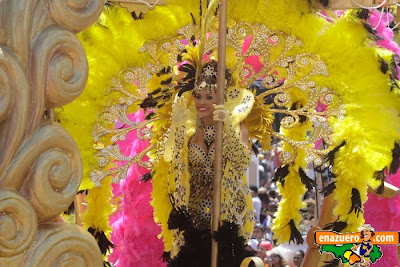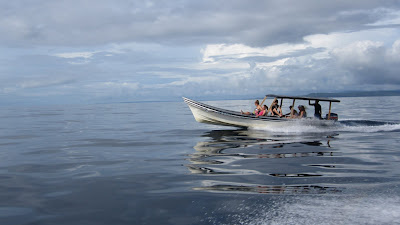
Panamanians love to celebrate and have a good time. Any reason to call up some friends get a
caja (case) of beer and put on some music and it is a party. Even my neighbor tells me that ever Friday is
Sabado Chiquito or little Saturday...that alone is reason enough to celebrate right?! But a party that lasts that lasts for 5 nights and 4 days, you can guarantee they look forward to that all year long and pull out all the stops. I know we have Mardi Gras in the US, but I have never experienced a
entire country shutting down to party. Carnivals happen all over, from huge New Orleans style celebrations, to smaller Carnival like fairs, to neighborhood gatherings. Here in Panama key elements of a good Carnival include water, music, dancing, street meat,
reinas (queens-in both senses of the word)
, and a beer or two. To celebrate Carnival has its own verb, "
Carnavalear" or "To Carnival"...in action
, one says "
Carnavaleando" or "Carnivaling".
"Estoy carnavaleando!" or "I'm carnivaling!"


One of my favorite outfits! The Geisha Reina.

After a little convincing from my friends and remembering that this is my last year here in Panama, I headed down to what is considered the heartland of Panama, an area called the Azuero. It is a big peninsula that juts out into the pacific side of the country. It is also home to the biggest Carnival in Panama, in the town of Las Tablas. There are almost no hotels in the area, and to take advantage of the huge influx of visitors, local families rent out there homes. They literally clear out everything and move into the backyard for 5 days. Several Peace Corp volunteers who live in the area, rented out houses so it was one big sleepover.
Carnival kicked off Friday night March 4th with parades and a huge dance party that went all night. Then Saturday day was the start of the culecos or huge tanker trucks filled with water that are parked all around this huge square. In between getting sprayed, dancing and eating, the floats start to come through. Here in Panama, there is Calle Arriba and Calle Abajo. These are the two queens and each one has their own floats, outfits and bands. After the culecos end for the day everyone goes home to nap, eat and get ready to go out again that night. Another huge dance party Saturday night followed by another Sunday of culecos...all until the party comes to an end Tuesday night.
A view from one of the tanker trucks looking out over the streets in Las Tablas. The band for one of the floats is in the middle.
I left the party Sunday afternoon with my friend Joanna, but on our way back we decided we hadn't had enough Carnival. So we called up a few other friends and went to another party in a town called Dolega, in the province of Chiriqui. This one was much more mellow, more like a fair. There was still culecos, lots of music and food. We even decided to go back that night to go dancing. While i was dead tired on Tuesday as I headed home, I was so glad i got to experience not one, but two very different Carnivals.

 There are three meetings that myself and the staff have with a community before they are eligible to receive a volunteer. The first meeting I visit the community, usually with other PCV's who live nearby, to walk around talk with local leaders and generally check it out to gauge interest in Peace Corp. If that visit goes well, I set up a second meeting where the program assistant comes out and talks more about what is Peace Corp, who are the volunteers and what are the commitments the community has to make to work with Peace Corp. The third meeting is then with the director who talks about the project the community was to work on with a volunteer. The above photo is of one of the programming assistants, Antonella, presenting the information at a school.
There are three meetings that myself and the staff have with a community before they are eligible to receive a volunteer. The first meeting I visit the community, usually with other PCV's who live nearby, to walk around talk with local leaders and generally check it out to gauge interest in Peace Corp. If that visit goes well, I set up a second meeting where the program assistant comes out and talks more about what is Peace Corp, who are the volunteers and what are the commitments the community has to make to work with Peace Corp. The third meeting is then with the director who talks about the project the community was to work on with a volunteer. The above photo is of one of the programming assistants, Antonella, presenting the information at a school.  Plenty of space to park and its free. No need to read the parking rules here. Complete with security guards and everything!
Plenty of space to park and its free. No need to read the parking rules here. Complete with security guards and everything!











 August. I knew this month was coming closer with every flip of my calender, but it snuck up me as it usually does. This year, August has brought with it many important milestones in my life. First and foremost, the 17th meant turning 29. Scary to think about entering the last year of your twenties. The twenties have been good to me and I don't want them to end. Secondly, the 14th meant exactly two years here in Panama. Those of us from my group (62) who have stuck it out, got together to reflect, talk about where we go from here and to celebrate our accomplishments. It is sad to think about leaving my community and not seeing the great friends I have made here on a regular basis. Third, and maybe the most exciting is that my mom is here visiting! She came to celebrate my birthday with me and see Panama. We spent some time in the mountains, three nights in my community and of course are seeing some of the beautiful beaches of Bocas.
August. I knew this month was coming closer with every flip of my calender, but it snuck up me as it usually does. This year, August has brought with it many important milestones in my life. First and foremost, the 17th meant turning 29. Scary to think about entering the last year of your twenties. The twenties have been good to me and I don't want them to end. Secondly, the 14th meant exactly two years here in Panama. Those of us from my group (62) who have stuck it out, got together to reflect, talk about where we go from here and to celebrate our accomplishments. It is sad to think about leaving my community and not seeing the great friends I have made here on a regular basis. Third, and maybe the most exciting is that my mom is here visiting! She came to celebrate my birthday with me and see Panama. We spent some time in the mountains, three nights in my community and of course are seeing some of the beautiful beaches of Bocas. 






 Pumping up the energy with some games or
Pumping up the energy with some games or  Maria, a officer from a
Maria, a officer from a 
 Part of the group hard at work. We divided up the room by type of business. This is the tourism table.
Part of the group hard at work. We divided up the room by type of business. This is the tourism table.